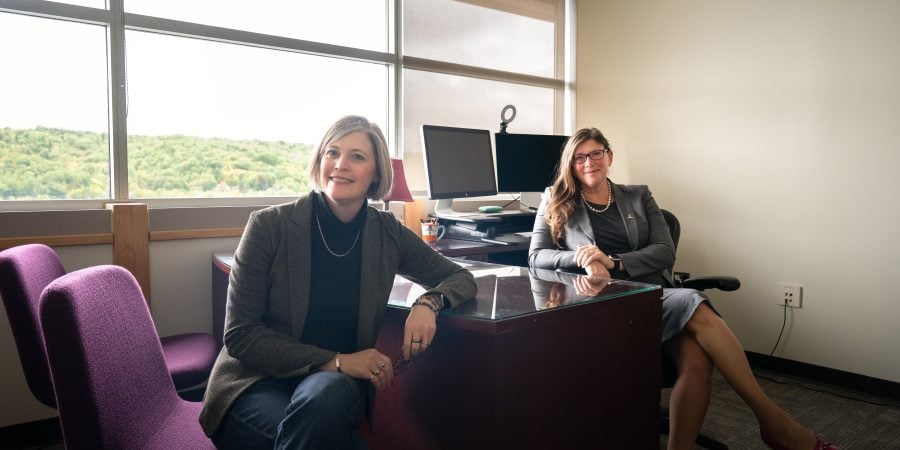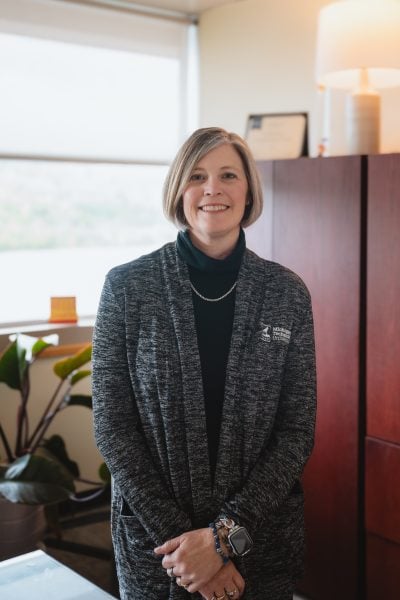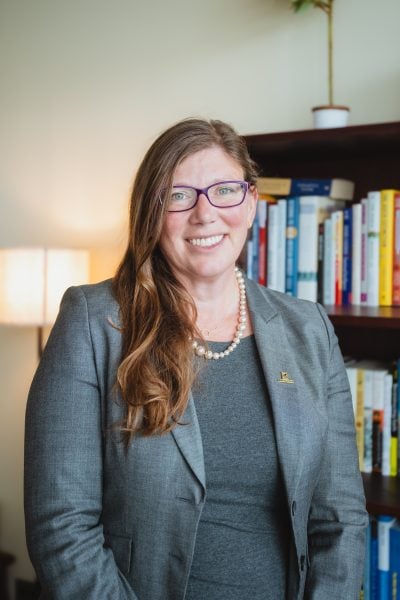
When Dean Michelle Scherer arrived at Michigan Tech’s College of Engineering at the start of the 2024-2025 academic year, she brought with her a new vision of engineering education excellence. Known for its hands-on, practical approach, the College of Engineering under her leadership would train collaborative and imaginative engineers from all backgrounds to develop, test, and build real solutions to meet the challenges of tomorrow.
This summer, Dean Scherer welcomed two new associate deans to the College’s administration who will work closely with her to deliver on that vision of world-class education, research, and leaders
Amy Landis, associate dean for graduate and online education (ADG) and professor in the Department of Chemical Engineering, supports graduate student recruitment, retention, and success, while overseeing the administration of the online graduate engineering programs. Prior to joining Tech, Landis was a professor of civil and environmental engineering at the Colorado School of Mines. There, she served as the Presidential Faculty Fellow for Diversity, Inclusion, and Access and currently serves as a visiting professor at the Santo Domingo Institute of Technology in the Dominican Republic.
Audra Morse, associate dean for academic affairs (ADAA) and professor in the Department of Civil, Environmental, and Geospatial Engineering (CEGE), leads undergraduate curriculum, recruitment, and support across the College’s nine departments. Morse previously served as CEGE department chair and as interim dean for the College of Engineering during the 2023-2024 academic year. Morse, a dedicated leader in engineering education and accreditation, is a Fellow in the American Society of Civil Engineers (ASCE), member of the Environmental Engineering and Science Foundation board and an Executive Committee member for the ABET.
“Audra and Amy are all in on our shared vision that tomorrow needs every engineer,” said Scherer. “With the two of them helping to lead the pack, I see exciting things happening for our students.”
“Even in the few short months they have been in their roles, Audra and Amy are creating new, innovative experiences and learning opportunities for both undergraduate and graduate students. I am delighted that they have taken on these important leadership roles and consider it a privilege to have a chance to work with both of them.” – Michelle Scherer, Dean, Michigan Tech College of Engineering
Q&A with Amy Landis and Audra Morse
In their own words, Landis and Morse discuss the new academic year, their new roles, and the necessity of good mentorship.
Q: Amy, this is your first semester at Michigan Tech. How are you settling into Husky life?
AL: As you can imagine, it’s been hectic moving, unpacking, having my kid start a new elementary school, and learning about all the cool things going on at Michigan Tech! I’ve only been here a month, but I’m so happy that the Michigan Tech community has been so welcoming. People have been generous with advice on fun things to do and helping us get settled in.
Q: Audra, you’ve been a faculty member at Tech since 2017. What’s something you look forward to every academic year?
AM: I look forward to mentoring and teaching the students in our programs, especially the incoming students. They’re so excited to be here at Michigan Tech, and I’m buoyed by their energy and enthusiasm about their major, which is why I really love to teach the first-year class in the environmental engineering program. The beginning of the year is also one of the most exciting times for the students in the Built World Enterprise, for which I’m faculty advisor, because they’re in the ideation phase of their engineering designs.

Q: What excites you both about your new roles within the College of Engineering?
AL: Mentoring has long been a passion of mine. I really enjoy helping people pursue careers in STEM. As associate dean of graduate and online education, I’m excited to support faculty as they mentor grad students, grad students as they progress toward careers in STEM, and undergrads who might be thinking about grad school.
AM: Many academics, especially those in leadership, often say that the department chair job is the toughest job on campus. And very humbly, I agree with that. So, I’m excited to be in a position to help department chairs, my faculty and staff colleagues, and students be more successful. I hope to be a helping hand, especially for department chairs, by freeing up some of their bandwidth so that they can better serve their departments.
Q: Audra, as associate dean for academic affairs, you oversee curriculum innovation in the College’s academic programs. Why does Michigan Tech’s engineering curriculum stand out? What’s ahead that you’re excited about?
AM: Our focus on hands-on learning through opportunities such as Enterprise, lab classes, and courses with design projects that make the difference. Our colleagues also make the difference, by leveraging their real-world experiences, passion for education, and their energy to be able to create these learning environments for our students. This combination is not present at other universities.
Q: Amy, as associate dean for graduate and online education, you support graduate student recruitment, retention, and success. In your opinion, what does good mentoring look like for engineering graduate students? In what ways are you looking to innovate the graduate student experience here in the College of Engineering?
AL: Good mentorship is a relationship. And relationships take work! As mentors we have to continually reflect on our strategies and strive to improve. A good mentor not only shares their engineering expertise, but helps mentees make informed decisions and achieve their professional and personal goals. I’m new to Tech, so I’m in the learning stage. I’m looking forward to hearing from grad student mentees and their mentors about their experiences and ways that I can support them.
Q: You’ve both had fruitful careers as academics, researchers, and engineers prior to stepping into these new roles. Is there a moment that stands out to you that affirmed your career decisions, either as an engineer or engineering educator? How might that moment (or moments) influence the work you do today?
AL: I am so proud of the many students I’ve mentored over the years! It’s so cool to witness their development into amazing people and engineers. My former students work for think tanks, work for the government, are faculty at other universities, and have started companies; they’re everywhere doing really cool things. This—the success and happiness of the students I’ve had the honor to mentor and advise—is what continually reaffirms my decision to be an engineering educator.
AM: I think being the advisor for the Built World Enterprise has re-affirmed my career decision, as in that role I am able to be a teacher, mentor, and engineer. My students’ successes bring me joy and I’m blessed to be able to work and learn with them.
Q: As Dean Michelle Scherer wrote in her “Welcome from the Dean,” we’re in an age of rapid change. How is the Michigan Tech College of Engineering ready to address these changes? How are we preparing our students?
AM: I think our history and our strengths are what gives us the edge. Engineering education research reinforces that students learn best while doing. Our lab classes, Enterprise program, and focus on design in core curriculum is key to prepare our students to think critically and to connect unique ideas and experiences to solve problems that we can’t even define today. I see the amazing work our students do in Enterprise all the time.

Q: Michigan Tech is fortunate to be positioned here in the Keweenaw Peninsula. What do you love about living here?
about living here?
AL: I love the water and being close to nature. My husband, daughter and I love to ski, tube, fish, kayak, and hike. We also enjoy snow and haven’t been able to use our snowmobiles much in the past few years, so we’re really looking forward to snowmobile trips. I hear I should be able to snowmobile on my commute to campus!
AM: I love the nature that surrounds us and the fun activities we can do here. And this may start a debate but my favorite season is snow season (although I wouldn’t mind a little more sunshine in the winter). I love winter sports the most and the lack of insects to bug me.
Q: When you’re not hard at work advancing the mission of the College of Engineering, how do you like to spend your free time?
AM: I spend my free time with my family, which includes my husband, two teenage boys, and my loving dogs. Beyond that, I spend a lot of time giving to my profession through my service activities with the ASCE (American Society of Civil Engineers) and ABET.
Q: Do you have any advice or words of wisdom to share with the College of Engineering community as we embark on another academic year?
AL: I like this quote by Abraham Lincoln: “Folks are usually about as happy as they make their minds up to be.”
AM: I’m referencing the quote by Maya Angelou that I’ve had in my email signature for a while: “Do the best you can until you know better. Then when you know better, do better.” It reminds me that I will not do things perfectly but I won’t grow or have an impact unless I try. As such, I should have grace with myself and others and keep trying to continuously improve.
About the College of Engineering
Michigan Tech’s College of Engineering offers more than 15 bachelor of science degrees in biomedical engineering, chemical engineering, civil, environmental and geospatial engineering, electrical and computer engineering, engineering fundamentals, geological and mining engineering and sciences, manufacturing and mechanical engineering and technology, materials science and engineering, and mechanical and aerospace engineering.
Our engineering graduate degree options include master’s and PhD programs, along with robust online certificate programs for busy professionals. Follow Michigan Tech Engineering on Facebook, Instagram, LinkedIn, and Twitter for the latest happenings.